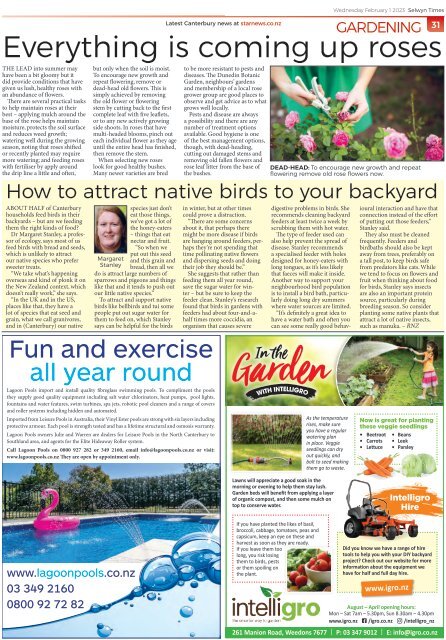Selwyn Times: February 01, 2023
You also want an ePaper? Increase the reach of your titles
YUMPU automatically turns print PDFs into web optimized ePapers that Google loves.
THE LEAD into summer may<br />
have been a bit gloomy but it<br />
did provide conditions that have<br />
given us lush, healthy roses with<br />
an abundance of flowers.<br />
There are several practical tasks<br />
to help maintain roses at their<br />
best – applying mulch around the<br />
base of the rose helps maintain<br />
moisture, protects the soil surface<br />
and reduces weed growth;<br />
watering well during the growing<br />
season, noting that roses shifted<br />
or recently planted may require<br />
more watering; and feeding roses<br />
with fertiliser by apply around<br />
the drip line a little and often,<br />
but only when the soil is moist.<br />
To encourage new growth and<br />
repeat flowering, remove or<br />
dead-head old flowers. This is<br />
simply achieved by removing<br />
the old flower or flowering<br />
stem by cutting back to the first<br />
complete leaf with five leaflets,<br />
or to any new actively growing<br />
side shoots. In roses that have<br />
multi-headed blooms, pinch out<br />
each individual flower as they age<br />
until the entire head has finished,<br />
then remove the stem.<br />
When selecting new roses<br />
look for good healthy bushes.<br />
Many newer varieties are bred<br />
Latest Canterbury news at starnews.co.nz<br />
to be more resistant to pests and<br />
diseases. The Dunedin Botanic<br />
Garden, neighbours’ gardens<br />
and membership of a local rose<br />
grower group are good places to<br />
observe and get advice as to what<br />
grows well locally.<br />
Pests and disease are always<br />
a possibility and there are any<br />
number of treatment options<br />
available. Good hygiene is one<br />
of the best management options,<br />
though, with dead-heading,<br />
cutting out damaged stems and<br />
removing old fallen flowers and<br />
rose leaf litter from the base of<br />
the bushes.<br />
GARDENING 31<br />
Everything is coming up roses<br />
ABOUT HALF of Canterbury<br />
households feed birds in their<br />
backyards – but are we feeding<br />
them the right kinds of food?<br />
Dr Margaret Stanley, a professor<br />
of ecology, says most of us<br />
feed birds with bread and seeds,<br />
which is unlikely to attract<br />
our native species who prefer<br />
sweeter treats.<br />
“We take what’s happening<br />
overseas and kind of plonk it on<br />
the New Zealand context, which<br />
doesn’t really work,” she says.<br />
“In the UK and in the US,<br />
places like that, they have a<br />
lot of species that eat seed and<br />
grain, what we call granivores,<br />
and in (Canterbury) our native<br />
Margaret<br />
Stanley<br />
species just don’t<br />
eat those things,<br />
we’ve got a lot of<br />
the honey-eaters<br />
– things that eat<br />
nectar and fruit.<br />
“So when we<br />
put out this seed<br />
and this grain and<br />
bread, then all we<br />
do is attract large numbers of<br />
sparrows and pigeons and things<br />
like that and it tends to push out<br />
our little native species.”<br />
To attract and support native<br />
birds like bellbirds and tui some<br />
people put out sugar water for<br />
them to feed on, which Stanley<br />
says can be helpful for the birds<br />
in winter, but at other times<br />
could prove a distraction.<br />
“There are some concerns<br />
about it, that perhaps there<br />
might be more disease if birds<br />
are hanging around feeders, perhaps<br />
they’re not spending that<br />
time pollinating native flowers<br />
and dispersing seeds and doing<br />
their job they should be.”<br />
She suggests that rather than<br />
feeding them all year round,<br />
save the sugar water for winter<br />
– but be sure to keep the<br />
feeder clean. Stanley’s research<br />
found that birds in gardens with<br />
feeders had about four-and-ahalf<br />
times more coccidia, an<br />
organism that causes severe<br />
DEAD-HEAD: To encourage new growth and repeat<br />
flowering remove old rose flowers now.<br />
How to attract native birds to your backyard<br />
Wednesday <strong>February</strong> 1 <strong>2023</strong> <strong>Selwyn</strong> <strong>Times</strong><br />
digestive problems in birds. She<br />
recommends cleaning backyard<br />
feeders at least twice a week by<br />
scrubbing them with hot water.<br />
The type of feeder used can<br />
also help prevent the spread of<br />
disease. Stanley recommends<br />
a specialised feeder with holes<br />
designed for honey-eaters with<br />
long tongues, as it’s less likely<br />
that faeces will make it inside.<br />
Another way to support your<br />
neighbourhood bird population<br />
is to install a bird bath, particularly<br />
doing long dry summers<br />
where water sources are limited.<br />
“It’s definitely a great idea to<br />
have a water bath and often you<br />
can see some really good behavioural<br />
interaction and have that<br />
connection instead of the effort<br />
of putting out those feeders,”<br />
Stanley said.<br />
They also must be cleaned<br />
frequently. Feeders and<br />
birdbaths should also be kept<br />
away from trees, preferably on<br />
a tall post, to keep birds safe<br />
from predators like cats. While<br />
we tend to focus on flowers and<br />
fruit when thinking about food<br />
for birds, Stanley says insects<br />
are also an important protein<br />
source, particularly during<br />
breeding season. So consider<br />
planting some native plants that<br />
attract a lot of native insects,<br />
such as manuka. – RNZ<br />
Fun and exercise<br />
all year round<br />
Lagoon Pools import and install quality fibreglass swimming pools. To compliment the pools<br />
they supply good quality equipment including salt water chlorinators, heat pumps, pool lights,<br />
fountains and water features, swim turbines, spa jets, robotic pool cleaners and a range of covers<br />
and roller systems including hidden and automated.<br />
Imported from Leisure Pools in Australia, their Vinyl Ester pools are strong with six layers including<br />
protective armour. Each pool is strength tested and has a lifetime structural and osmosis warranty.<br />
Lagoon Pools owners Julie and Warren are dealers for Leisure Pools in the North Canterbury to<br />
Southland area, and agents for the Elite Hideaway Roller system.<br />
Call Lagoon Pools on 0800 927 282 or 349 2160, email info@lagoonpools.co.nz or visit:<br />
www.lagoonpools.co.nz They are open by appointment only.<br />
Garden<br />
In the<br />
with intelligro<br />
As the temperature<br />
rises, make sure<br />
you have a regular<br />
watering plan<br />
in place. Veggie<br />
seedlings can dry<br />
out quickly, and<br />
bolt to seed making<br />
them go to waste.<br />
Lawns will appreciate a good soak in the<br />
morning or evening to help them stay lush.<br />
Garden beds will benefit from applying a layer<br />
of organic compost, and then some mulch on<br />
top to conserve water.<br />
Now is great for planting<br />
these veggie seedlings<br />
• Beetroot • Beans<br />
• Carrots • Leek<br />
• Lettuce • Parsley<br />
Intelligro<br />
Hire<br />
www.lagoonpools.co.nz<br />
03 349 2160<br />
0800 92 72 82<br />
If you have planted the likes of basil,<br />
broccoli, cabbage, tomatoes, peas and<br />
capsicum, keep an eye on these and<br />
harvest as soon as they are ready.<br />
If you leave them too<br />
long, you risk losing<br />
them to birds, pests<br />
or them spoiling on<br />
the plant.<br />
Did you know we have a range of hire<br />
tools to help you with your DIY backyard<br />
project? Check out our website for more<br />
information about the equipment we<br />
have for half and full day hire.<br />
www.igro.nz<br />
August – April opening hours:<br />
Mon – Sat 7am – 5.30pm, Sun 8.30am – 4.30pm<br />
www.igro.nz /igro.co.nz /intelligro_nz<br />
261 Manion Road, Weedons 7677 | P: 03 347 9<strong>01</strong>2 | E: info@igro.co.nz


















